ACTIONS
- Protect and safeguard cultural and natural heritage
- Learning and educational opportunities
- Cultural participation/social inclusion
- Sustainable tourism
- Support research
- Employment (recruiting, training, safety)
- Energy consumption, greenhouse gas emissions
- Waste management and reduction
- Transport (forms of, energy use)
- Commercial activities including copyright and IP
- Governance and management
- Security, disaster preparedness, risk reduction
- External partnerships and collaborations
- Publication/report
- Toolkit/framework/roadmap
- Case studies
Mind, Body, Spirit: how museums impact health and wellbeing

Intended Audience
Museums and museum workers working on collections-based health and wellbeing projects
- J. Dodd and C. Jones, Research Centre for Museums and Galleries, University of Leicester
“This publication reports the findings from a year-long action research project funded by Arts Council England (ACE) and initiated by the Research Centre for Museums and Galleries (RCMG), based in the School of Museum Studies at the University of Leicester. It sets out to show how museums are well placed to respond to changes in public health, using their collections to improve the health and wellbeing of individuals, to counter health inequalities within communities, and contribute positively to the goals of public health bodies.” (p.3)
Avaiable in
- English
SDGs LINKAGES
The resource can support SDG targets linked to equal access to heritage (part of 1.4), promoting health and wellbeing (3.4), promoting the value of culture and heritage as part of Education for Sustainable Development (4.7), inclusive and welcoming learning environments (4.A), infrastructure for wellbeing (part of 9.1), promoting social, economic and political inclusion (10.2), universal access to inclusive and accessible green and public spaces (11.7), and supporting policies for inclusion (part of 11.B). Sections on evaluation can support SDG 17.19 (measures of sustainable development beyond GDP).
Click on the SDG Target to discover Our Collections Matter indicators
-
Our Collections Matter indicators:
- Numbers and proportions of people from particular groups using collections in comparison with demographics in broader society.
- Numbers of people accessing collections.
- Number of targeted programmes that aim to enhance access to collections by disadvantaged groups.
- Sustainable tourism that enhances local communities’ access to basic services, ownership and control over land and other forms of property (including cultural and natural heritage), as well as to technology and markets.
- Involvement of people from disadvantaged groups in decision-making activities and processes relating to collections and collections-based institutions.
-
Our Collections Matter indicators:
- Plans, policies and procedures in place for the safe use of collections, notably in relation to chemical, physical, biological and other forms of hazard.
- Proportion of users of collections facilities reporting positive well-being during and as a result of activities relating to collections.
- Number and proportion of programmes relating to collections that incorporate wellbeing considerations and perspectives.
- Number of targeted programmes drawing on collections that address issues relating to non-communicable diseases, supporting prevention and treatment.
-
Our Collections Matter indicators:
- Numbers of people in each type of programme drawing on collections from different demographic groups.
- Increases in numbers of people in each type of programme from different demographic groups.
- Proportion of people involved in such programmes in relation to overall audience size.
- Evidence that learners have acquired knowledge and skills to promote sustainable development.
-
Our Collections Matter indicators:
- Number and proportion of education facilities that are child, disability and gender sensitive.
- Proportion of education facilities that provide safe, non-violent, inclusive and effective learning environments for all.
- Number and type of initiatives to improve effectiveness of learning environments.
- Support given to other education facilities to make them more inclusive and effective.
-
Our Collections Matter indicators:
- Development of research-useful collections to support reliable, sustainable and resilient use by researchers and others.
- Number and proportion of collections facilities and stores that support economic development and human well-being.
- Number and proportion of collections facilities and stores that provide affordable and equitable access for all.
- Investment in collections facilities.
- Inclusion of collections information in regional and transborder initiatives, notably via digital access for discoverability.
-
Our Collections Matter indicators:
- Collections development to ensure that collections effectively meet the needs of all, irrespective of age, sex, disability, race, ethnicity, origin, religion or economic or other status.
- Number and proportion of educational and participatory programmes that promote participation irrespective of social or other status.
- Numbers and proportions of people making use of collections in relation to the demographic of the local population.
- Numbers and proportions of people involved in focused programmes aimed at promoting social, economic and political inclusion.
- Numbers and proportions of people from different demographic groups involved in decision-making processes relating to collections and collections-based institutions.
- Number and types of partnerships that build relationships with marginalized groups, individuals and communities.
-
Our Collections Matter indicators:
- Numbers of people accessing collecting institutions from different demographic groups, notably women, children, older people and persons with disabilities.
- Increases in numbers of people accessing collecting institutions from different demographic groups.
- Measures taken to remove barriers to access green and public spaces.
- Extent of green space provided by collections institutions.
-
Our Collections Matter indicators:
- Proportion of local governments that adopt and implement local disaster risk reduction strategies in line with the Sendai Framework for Disaster Risk Reduction 2015-2030a.
- Disaster Risk Reduction strategies and plans in place, in line with the Sendai Framework for Disaster Risk Reduction, to ensure collecting institutions and collections are factored into planning, and contribute effectively to Disaster Risk Reduction.
- Collections-based institutions included in local plans for social inclusion, resource use, and Disaster Risk Reduction.
-
Our Collections Matter indicators:
- Identification and implementation of measures for sustainable development incorporating social and environmental considerations.
- Identification and implementation of both quantitative and qualitative measures of sustainable development.
